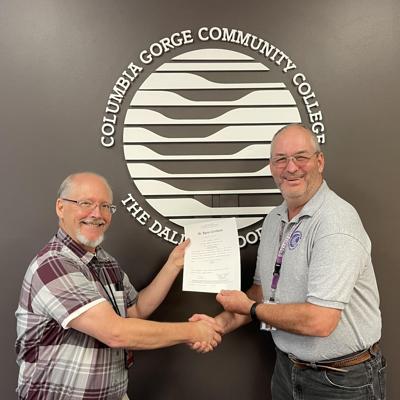By Dan Spatz Columbia Gorge Community College
Columbia Gorge Community College is home to America’s newest aviation maintenance technician training program upon official recognition this month by the Federal Aviation Administration. (FAA)
The achievement follows nearly four years of research and development as the college worked with industry partners and the FAA to validate job demand for aviation technicians, then developed a curriculum to meet the rigorous technical requirements of “Part 147 Airframe & Powerplant” training.
Students graduating from the program will be prepared for their FAA licensing test as aviation maintenance technicians. Licensure will allow them to maintain fixed-wing aircraft — jets as well as prop planes — and helicopters across the Pacific Northwest or anywhere in the United States.
America’s aviation industry faces an estimated shortage of 79,000 maintenance technicians by the year 2039, according to a 2020 estimate by the Aviation Technician Aviation Council (ATEC). The global aviation industry will need 626,000 technicians over the next 20 years, according to a 2021 projection by Boeing. Existing training programs do not have the capacity to meet that demand, ATEC determined. Demand is driven by growth of civil aviation and an aging workforce.
“This approval by the FAA marks an historic milestone in our college’s history,” said Dr. Marta Cronin, CGCC’s president. “Our goal is to make CGCC a destination institution. Given the vast, unmet need for aviation technicians and the family-wage salaries offered by these careers, we are pleased to be part of the national network of community colleges providing this vital training.”
Cronin cited encouragement from FAA training officials in Portland, industry partners such as Horizon Air, and other colleges as CGCC developed the program. For instance, faculty at Lane Community College provided guidance and site tours of their extensive program in Eugene.
As a new program, CGCC’s Aviation Maintenance Technician training is designed to comply with a recent Congressionally-mandated reform of aviation technician training. The 18-month program comprises 104 credit hours of instruction in 45 subject areas. Students emerge with an associate of arts and science degree, together with airframe and powerplant certificates required to qualify for FAA testing to become licensed aviation mechanics.
Students learn equipment operation, maintenance and trouble-shooting in such varied topics as navigation and communication equipment, oxygen, pressurization, heating, ice and rain protection systems, fuel control, hydraulics, welding and sheet metal fabrication, wood and composite structures, piston and turbine engines, and maintenance record-keeping. Most is hands-on experience.
Enrollment in Airframe and Powerplant pre-requisite instruction is available for the 2022-23 academic year. CGCC joins “A&P” programs offered by Lane and Portland community colleges in Oregon; the closest community college programs in Washington State are in Puyallup, Moses Lake and Spokane.
“I am grateful for CGCC’s dedicated career-tech faculty team and the unwavering support of the local and regional aviation community,” said lead instructor Bryan Despain, who brings three decades of experience with Delta Airlines to the college. Despain designed the curriculum and was instrumental in obtaining equipment for the training lab. “CGCC and I are excited to embark on this wonderful adventure in offering aviation maintenance as part of our suite of certificates and associate degree programs.”
Civil aviation continues to expand in the United States, with more than 5,000 general aviation airports operating and hundreds of thousands of aircraft, according to the FAA.
“The aviation maintenance technician role continues to evolve as new generation airplanes become more prevalent in the global fleet,” Boeing noted in its 2021 annual industry assessment. “With the increasing use of sensors and flight data recorders, the global commercial fleet could generate over 100 million terabytes of data annually by end of the decade. This could enable new predictive solutions, which would drive a need for technicians who can accurately analyze, interpret and act on the information generated. Older aircraft remain in service, which will require technicians with a wide set of skills to maintain aircraft that were built decades ago.”
“We are thrilled to welcome this new program to the aviation mechanic education community,” said Crystal Maguire, executive director of the Aviation Technician Education Council, which is based in Oklahoma. “CGCC will play a vital role in the Northwest, creating sorely needed talent to support industry’s projected growth. Planes cannot fly without maintenance technicians, and those with the requisite skills and certification are and will continue to be in high demand.”
Since embarking upon this new program, the college reached several preliminary milestones: Two aircraft have been donated, and the college secured temporary, leased warehouse space at Port of The Dalles. It has a draft lease with Columbia Gorge Regional Airport, where funding is pending from the U.S. Economic Development Administration to construct a dedicated training hangar and expand the airport industrial park. (The airport is jointly owned by City of The Dalles and Klickitat County, both of which are providing matching funds for the $3.5 million EDA grant.)
In 2021 the college and Horizon Air approved a memorandum of understanding establishing CGCC as an official training partner of Horizon Air. As part of this, students enrolled in the CGCC program are eligible to participate in the “Horizon Technician Development Program,” which provides qualified students with a stipend to complete training in exchange for committing to employment with Horizon for a two-year, six-month period.
This past June the college received aviation maintenance program approval from its accrediting authority, the Northwest Commission on Colleges and Universities.
Students enrolled in the aviation maintenance program as well as other career-tech and general education programs at CGCC may also choose on-campus student housing. Because of the region’s shortage of affordable housing options, the college opened a student residence hall with on-campus meals plan in September 2021, at the same time it opened its Columbia Gorge Regional Skills Center.
